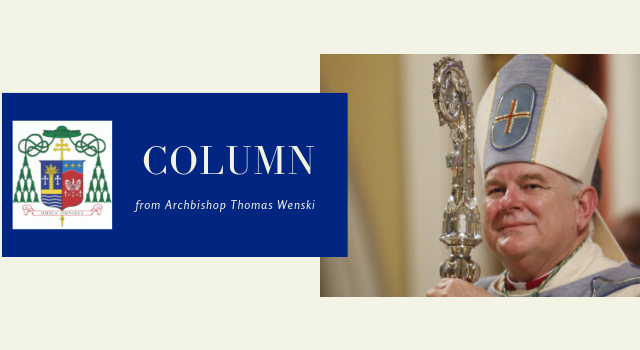By Archbishop Thomas Wenski - The Archdiocese of Miami
Autumn has arrived — although here in South Florida, its arrival is less dramatic than in the North, where leaves change colors and a nip in the air portends wintery snows. The fall season does invite us Catholics to reflect on what spiritual writers have called the “Last Things.” These “Last Things,” of course, are Death, Judgment, Heaven (for many, if not for most of us, via purgatory) and Hell.
And so, November — the next to the last month of our calendar year —begins with the Solemnity of All Saints followed by the feast of All Souls. These liturgical commemorations are a lesson in ecclesiology, or in how the Church understands herself. The Church, as the Second Vatican Council reminded us, is essentially a communion: through baptism we enter into the very life of God —the Father, Son and Holy Spirit. In the Eucharist, we have communion with one another in the Body and Blood of Christ.
That communion which is ours in Christ is also called in the Creeds “the communion of saints.” And that expression is a wonderful way of answering the question, what is the Church? For what is the Church, but the assembly of all the saints, living and dead?
And that communion is only severed by serious sin. Death does not sever our communion with the saints. Therefore, tradition has spoken of three states of the Church: the Church triumphant — those of our numbers who have already entered into the glory of everlasting life; the Church suffering — those of the faithful departed who will soon enter heaven but are now experiencing the final purgation or purification that we Catholics call purgatory; and the Church militant — that is those of us who, while citizens of heaven and thus called to be saints through our baptism, are still on our pilgrimage on earth, traversing as it were, alien land until we reach our true fatherland, the kingdom of heaven.
These feasts also help underscore for us what is one of the central teachings of the Second Vatican Council — a teaching that certainly is not something new or original to the Council but a teaching which the Council wished to give a renewed emphasis — namely, the universal call to holiness that each Christian receives in baptism.
The 19th century spiritual writer Leon Bloy wrote: “Stand still, and look deep into the motivations of life. Are they such that true foundations of sanctity can be built on them? For truly we have been born to be saints — lovers of Love who died for us! There is but one tragedy: not to be a saint.”
As autumn transitions to winter and the days grow shorter, we do well to remember the shortness of our lives and mediate on those “Last Things” that await us all. But, thanks to the feasts of All Saints and All Souls, our reflections do not have to be morose but should be hopeful.
The Catechism of the Catholic Church teaches: “Hope is the theological virtue by which we desire the kingdom of heaven and eternal life as our happiness, placing our trust in Christ’s promises and relying not on our strength, but on the help of the grace of the Holy Spirit.” (CCC #1817)
Our belief in purgatory — the final purification of the elect — helps us Catholics to remain firm in that hope, thus avoiding both despair and presumption. Despair is contrary to God’s goodness, to his justice — for the Lord is faithful to his promises, and to his mercy. Because there is a purgatory, we need not despair of our own or our loved ones’ personal salvation if, when we die, we still fall short of the perfect holiness required to enter into God’s presence.
And while guarding us from despair, our belief in purgatory also protects us from falling into presuming that we can save ourselves — without the help of God’s grace — or that we can obtain forgiveness without conversion, or glory without merit. (Cf. CCC #2091, 2092)

